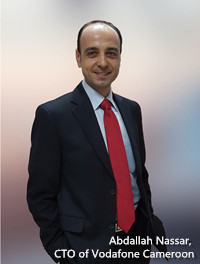Vodafone Cameroon: To Be the No.1 Broadband Provider in Cameroon
 Vodafone is one of the world’s largest telecom companies, providing a range of services including voice, messaging, data and fixed communications. Afrimax is a 4G-LTE telecom operator in sub-Saharan Africa. Vodafone and Afrimax announced a new non-equity partner market agreement for Cameroon. The two companies will launch LTE data services under the “Vodafone Cameroon” brand initially in Cameroon’s two biggest cities, Douala and Yaoundé. Recently, ZTE Technologies interviewed Abdallah Nassar, CTO of Vodafone Cameroon. He shared with us Vodafone Cameroon’s major achievements, overall networking strategy, challenges, and LTE project. He also talked about his expectations for ZTE and outlook on the global telecom market.
Vodafone is one of the world’s largest telecom companies, providing a range of services including voice, messaging, data and fixed communications. Afrimax is a 4G-LTE telecom operator in sub-Saharan Africa. Vodafone and Afrimax announced a new non-equity partner market agreement for Cameroon. The two companies will launch LTE data services under the “Vodafone Cameroon” brand initially in Cameroon’s two biggest cities, Douala and Yaoundé. Recently, ZTE Technologies interviewed Abdallah Nassar, CTO of Vodafone Cameroon. He shared with us Vodafone Cameroon’s major achievements, overall networking strategy, challenges, and LTE project. He also talked about his expectations for ZTE and outlook on the global telecom market.
What were the major achievements of Vodafone Cameroon in 2016?
Could you tell us Vodafone Cameroon’s overall networking strategy?
Vodafone Cameroon’s overall networking strategy is to be the number one broadband provider in Cameroon that can deliver the highest data network speeds.
What major challenges are you facing as per your role? How do you overcome them?
The market is very challenging with aggressive competition. I think the main challenge is to keep the Vodafone network to its high standard. With the engagement with ZTE, Vodafone Cameroon presented the highest LTE throughput in Cameroon, new innovated data, and broadband products and services.
What differentiate us from other operators are the types of services and good customer experience that we are offering. Providing a more dynamic level of customer support can create greater levels of trust in the long-term. Service customization also has an important role to play.
Our criteria are reputation, technology and knowledge. What we value most is reputation. From experience, we know ZTE has built up its reputation by being more and more engaged with its clients. What I have learned from ZTE is that customer satisfaction is undeniable.
The LTE project is surely very important to us, because a revolutionary network will position Vodafone separately in Cameroon market. With LTE technology, Vodafone will be leading the broadband market in Cameroon and will be able to keep up with the technology pace. I think technology is the key to the LTE project. New and advanced technology is what ZTE has contributed to Vodafone Cameroon.
Also our network infrastructure will always remain as a concern. We expect to see 4G rollouts giving way to more nuanced infrastructure strategies. While the growth prognosis for 4G is not in doubt, we face very real choices about which iterations of LTE we will opt for as we focus on use cases in consumers and M2M in different markets.
At the same time, we should carefully weigh optimal combinations of new technologies with “bridging technologies” that help extract better performance from the existing assets.
ZTE has really invested in the relations with its clients. I think it is a unique, respectful and fully engaged experience with ZTE’s team. ZTE can deliver to customers with respect to project targets at any cost. For its solutions, ZTE has presented its new Zsmart in Cameroon. It is an advanced and unbeatable system. We are looking forward to a full IoT engagement with ZTE.
The telecom industry has changed radically in the past 10 years as data-hungry customers with smart devices consume ever more bandwidth. Over this period, operators have expanded their service portfolios and overhauled their price plans to meet the explosive demand, while rising capital expenditures to underline the ongoing imperatives to upgrade network capabilities.
Operator performance varies significantly by region. Telcos in mature markets have outperformed those in other markets, because they benefit from increased scale and strong secular growth opportunities respectively. While many players are diversifying their revenue streams, ensuring that new services deliver healthy margins remains challenging. At the same time, over-the-top (OTT) players are also expanding the scope of their offerings, disrupting different industry verticals in the process.
It’s very well noticeable that voice revenue is too much declining year-on-year in comparison with data revenue, and the digital is taking its first position rapidly. If we look to this globally, for sure IoT is the future. Being connected with everything at any time anywhere is changing the market and the telecom concept. However in details, in the African market, for example, we noticed that the data and smartphones penetration is not at its peak, but still at a very low percentage (less than 35%). In addition, we noticed that the market is slightly changing.With new technologies that ZTE and others are presenting, data networks are accessible in a very competitive manner.
I believe that the vast majority of participants see digital services accounting for an ever greater share of overall revenues. However, there is a significant spread in these predictions. Many respondents expect digital services to contribute between 0% to 5%, while others expect a contribution of 25% or more. Some of this could be explained by rates of attrition in operators’ legacy businesses, which would increase digital significance by default.